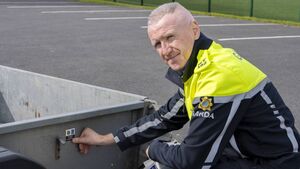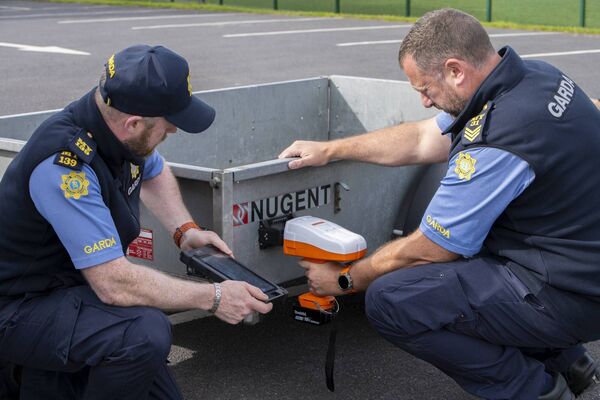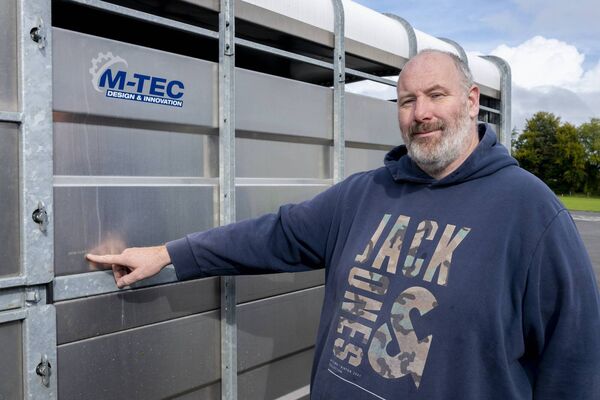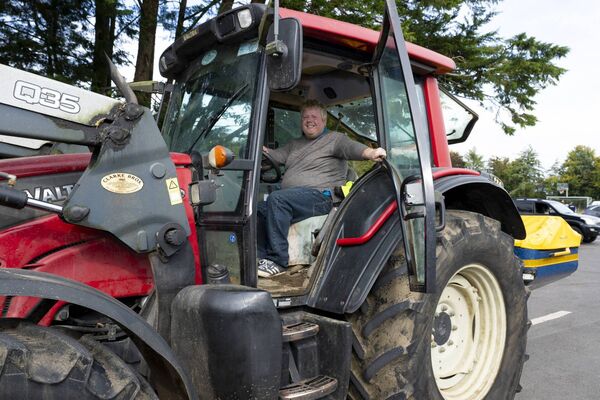Farmers aim to stay one step ahead of the thieves

Garda John Monaghan, Community Garda at Claremorris Station, organised the event. Picture: John Corless
Almost half of Irish farmers have been the victims of theft, according to the most recent major survey published.
The findings have heightened concern in rural communities where farmers say stronger deterrents, tougher laws and a greater Garda presence are urgently needed.
The Irish Farm Crime Survey, carried out between July and November 2022 by criminologists at Technological University Dublin with the support of the Irish Farmers’ Association (IFA), gathered responses from 1,333 farmers nationwide. It revealed that 18% of farmers had experienced theft in the previous 12 months, and almost half (46%) had been targeted within the last five years.
Equipment and tools accounted for just over one-fifth of thefts, while machinery made up 18%, fuel 12%, and money or personal items 6%. Although firearms theft was relatively rare, 11 participants reported losing a gun, mostly several years ago.
Yet the recovery rate for stolen items remained worryingly low.
“In just 11% of cases, the stolen property was ever recovered,” the study concluded.
In response, Gardaí in Mayo have been rolling out property-marking events where farmers can have their trailers, tools and machinery permanently etched with their name if they wish, but most are opting for the their Eircode to be indelibly marked on their equipment. The service is free of charge and only takes a few minutes.
The service was made available in Claremorris last week and local community Garda John Monaghan organised the event, which was held in the grounds of St Colman’s College.
“People bring in trailers, power tools, garden tools,” Gda Monaghan told the . “We etch in their Eircode, which acts as a deterrent for criminals, and we put on a sticker to indicate the item has been stamped. If Gardaí stop a trailer anywhere in the country, they can check the Eircode straight away. If it doesn’t match the driver’s address, we’ll investigate further in case it is stolen.”
Gda Monaghan said criminals would struggle to disguise stolen goods.
“Even if they peel the sticker off, the Eircode is permanently etched into the metal. We’ve had trailers, quads, lawnmowers, manure spreaders come in today – all worth a lot of money to people. Anything that makes theft less attractive has to be a positive.”
While Garda Monaghan admitted rural Ireland is not immune from crime, he stressed the initiative’s impact.
“Unfortunately, there’s crime all over the country. But this is about being proactive, about deterrence.”

Gda Sgt Jonathan Petrie, based at Foxford Station, described the marking machine as “a battery-operated puncher” that indelibly stamps an Eircode into metal surfaces.
“It’s there as a deterrent,” he said. “And if property is stolen and later recovered – say in a container in Cork – we can return it to the rightful owner. The real purpose is prevention, making the farmer conscious of theft in the first place.”
Sgt Petrie said the service, which began last year with Mayo County Council funding, has been used “nearly every week” at marts, shows and community events. Signage warning criminals that property marking is active in an area is also planned.
Farmers attending the Claremorris event said prevention was their main motivation. Adrian Fallon had brought along a cattle trailer valued at €10,000.
“Nothing has been taken from me, so far, thank God, but prevention is better than cure.”

Mr Fallon, who farms between Claremorris and Ballinrobe, said strong community ties were also a safeguard.
“There are good neighbours where I am. A lot of elderly people live in the village and they’re always looking out for each other. That community spirit makes a big difference.”
Another farmer, Edmund Feeney, came with a €7,000 fertiliser spreader.
“I’m getting it marked just in case,” he said. “Nothing has ever been stolen from me but it’s just about being ahead of it, for traceability.”

The TU Dublin survey also highlighted wider rural crime issues, including fly-tipping, illegal hunting, livestock worrying and trespassing.
Three-quarters of respondents admitted they were worried about theft, but nearly one-third (29%) said they did not report crimes to Gardaí, often believing that “Gardaí would do nothing” or that there was “insufficient evidence” to pursue.
Almost all participants (94%) felt courts were too lenient on offenders, with low conviction rates failing to act as a deterrent. Many called for tougher penalties, and 60% of farmers said a dedicated Garda rural crime unit is needed.
Some 82% of respondents agreed that farmers themselves must take responsibility for crime prevention, with 22% already investing in CCTV systems.
As Gardaí in Mayo continue their property-marking campaign, Gda Monaghan said the message is simple: “You pay a lot of money for your equipment - a small step like this could be the difference between losing it forever and getting it back, and the service is provided free of charge.”





